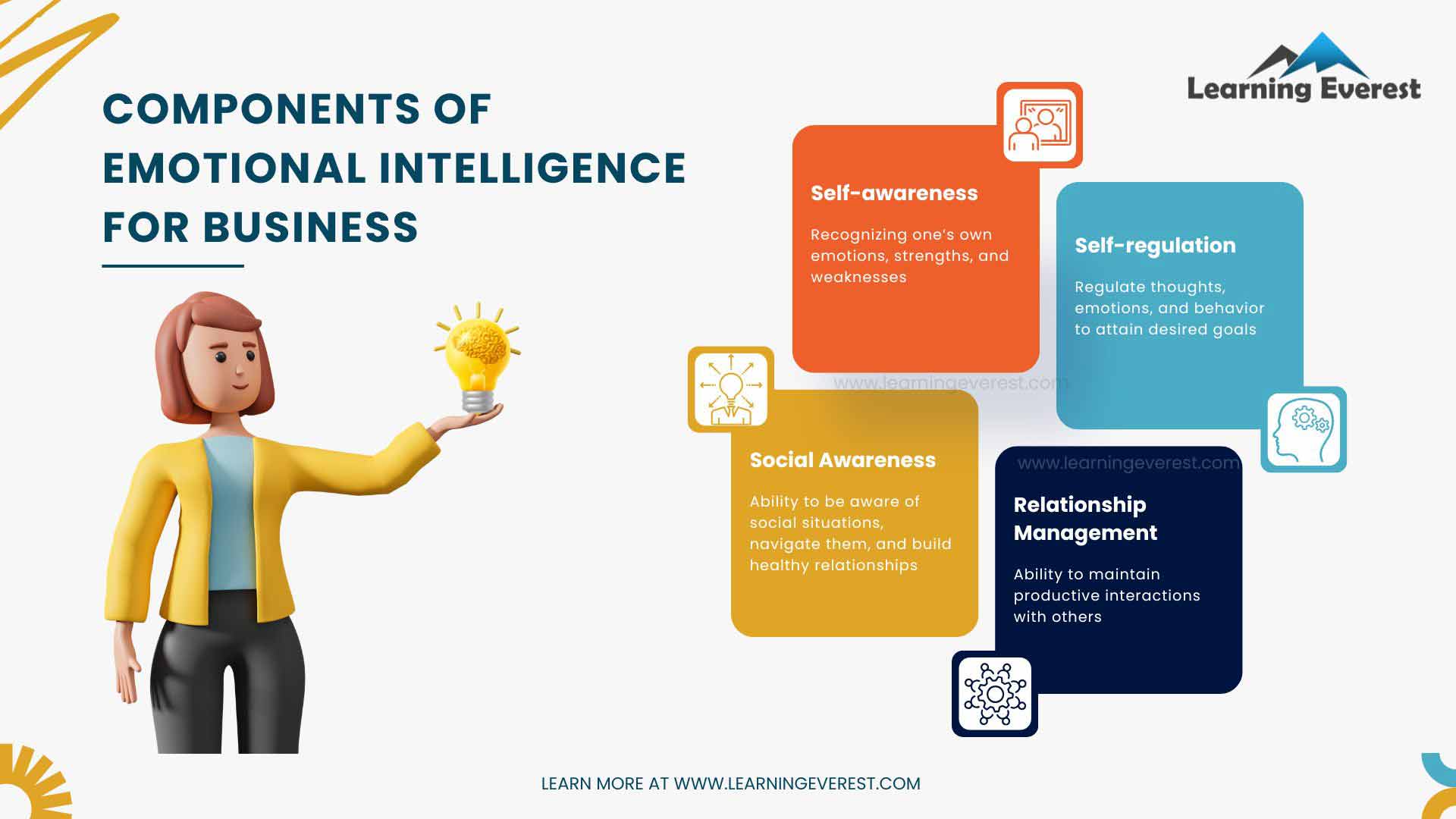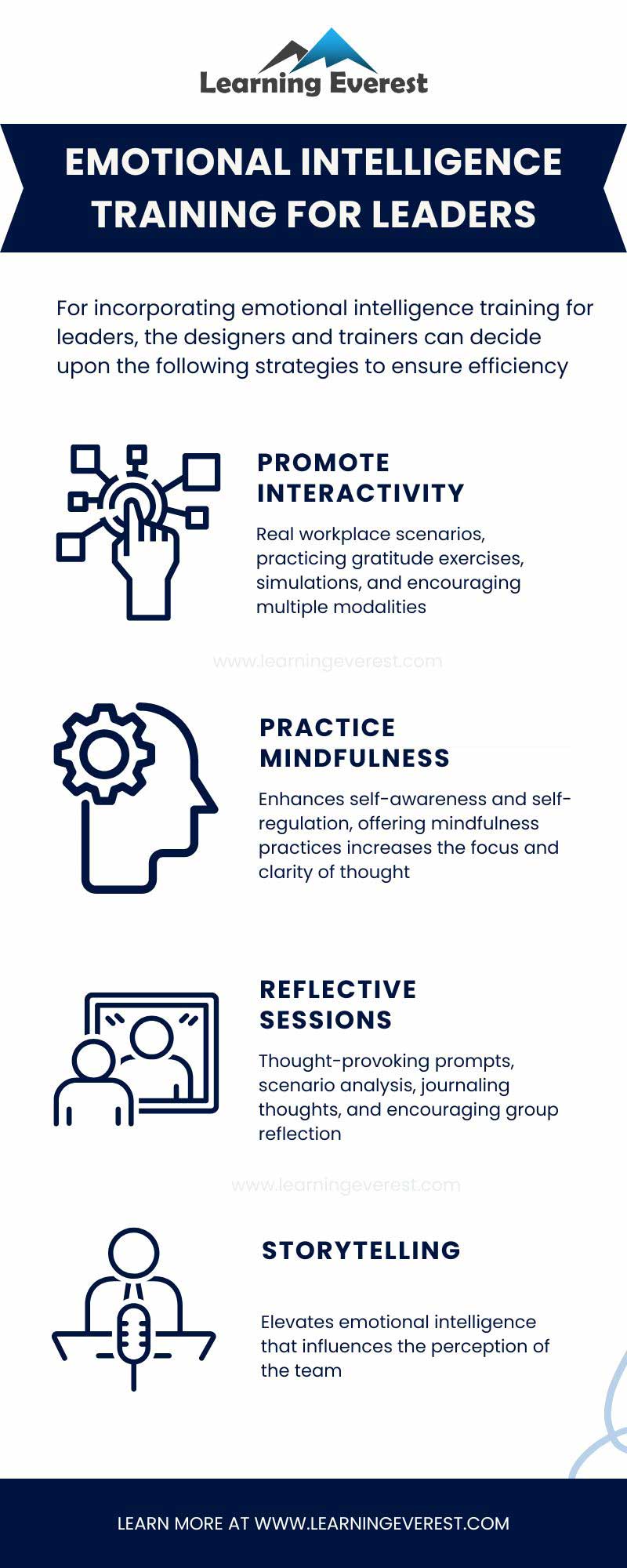Imagine a ship navigating in a vast sea, where breathtaking views inspire tranquility alongside fierce storms. How would the situation be if the captain upheld the same mindset in all the instances? Likewise, leaders in an organization should possess emotional intelligence to handle every situation and motivate their teams. This demands organizations prioritize emotional intelligence training for leaders.
Table of Contents
- Defining Emotional Intelligence
- Understanding the Components of Emotional Intelligence for Business
- Identifying the Benefits of Emotional Intelligence Training for Leaders
- Incorporating Emotional Intelligence Training for Leaders
- Conclusion
- Infographic
- Knowledge Check!
- Frequently Asked Questions (FAQs)
- What is Emotional Intelligence?
- What are the components of emotional intelligence?
- What are the benefits of emotional intelligence training for leaders?
The following paragraphs delve into detail what emotional intelligence and its components, the need for emotional intelligence training for leaders, and strategies for incorporating effective training.
Defining Emotional Intelligence
“Emotional intelligence refers to the ability to identify and manage one’s own emotions, as well as the emotions of others.” (Source: Psychology Today). The term ‘emotional intelligence’ was coined by researchers John Mayer and Peter Salovey in 1990 and popularized by psychologist David Goleman. Possessing emotional intelligence enables individuals to handle complex situations, cope with stress, encourage positive interactions, and make impactful decisions. This highlights the importance of upholding strong emotional intelligence in personal and professional spheres. According to TalentSmartEQ, “emotional intelligence has a 58% influence on job performance” and “90% of top performers at work have high emotional intelligence.” Inadequacy of emotional intelligence possessed by employees and leadership in an organization results in workplace conflicts and misunderstandings.
Understanding the Components of Emotional Intelligence for Business
For the well-being of every business, it is crucial to have a workforce with strong emotional intelligence collaborating. When the leadership possesses emotional intelligence, it encourages the team to perform their best yielding maximized organizational outcomes. Here are the components of emotional intelligence required in an organization.

Components of Emotional Intelligence for Business
Self-Awareness
Self-awareness refers to recognizing one’s own emotions, strengths, and weaknesses that elevate emotions impacting a person’s professional development. This quality helps individuals manage stress when interacting with the team and instills confidence to outshine others. For a leader, self-awareness can include awareness about strengths, weaknesses, emotional triggers, and others’ perceptions about him/her. To build self-awareness, the leaders can reflect upon their position and manner of response, and seek feedback from team members.
Self-Regulation
The ability to regulate thoughts, emotions, and behavior to attain desired goals. Incorporating self-regulation strategies at work reduces burnout, team morale, and conflict resolution by successfully managing impulses and creating a stable work environment. Leaders who master regulating themselves are resilient contributing immensely to the enhanced performance of the team.
Social awareness
Social awareness is the ability to be aware of social situations, navigate them, and build healthy relationships. Possessing social awareness enhances the empathy of the individuals, thereby building mutual trust, inclusivity, and communication. Moreover, it encompasses the understanding of broader dynamics and organizational culture enabling team collaboration and adaptability.
Relationship Management
Another crucial component of emotional intelligence is relationship management which is the ability to maintain productive interactions with others. Relationship management skills possessed by employees and leaders contribute significantly to boosting collaboration and teamwork. “86% of executives identify ineffective collaboration and communication as a major cause of failure in business.” (Source: Salesforce). The major competencies attained through relationship management are influencing others, coaching and mentoring, conflict management, teamwork, and inspirational leadership; all contributing significantly to professional enhancement.
Identifying the Benefits of Emotional Intelligence Training for Leaders
Leaders upholding emotional intelligence can influence others while managing their own emotions. To retain emotional intelligence and enrich it, organizations should provide emotional intelligence training for leaders to inspire and engage their teams. The benefits of Emotional Intelligence training for leaders are:
Enhances Decision-Making
Emotional intelligence training for leaders enhances decision-making skills for leaders by equipping them with the skills that encourage them to manage emotions, lessen burn-out, and value every individual alike. Moreover, it resolves conflicts thereby managing every crisis effectively and undertaking productive decisions. Making good decisions being a vital part of every business, and is necessary to be enhanced, and providing emotional intelligence encourages sound decision-making.
Elevates Communication Skills
By enhancing self-awareness and self-regulation, emotional intelligence training for leaders helps leaders realize their emotional triggers that hinder smooth communication with the team. In addition to imparting quality content with clarity in expression, the training equips leaders with active listening skills to hear the needs of the employees and respond effectively.
Fosters Empathy
Empathy is the ability of an individual to understand the emotions and perspectives of others or in other words stand in their shoes. Emotional intelligence training provides resources and activities to consider employees’ thoughts, ideas, and non-verbal cues allowing a more empathetic response.
Promotes an Inclusive Culture
Inclusivity in the workplace is a pivotal factor that drives employees to organizations and retains talent. When leaders are offered emotional intelligence training, they become competent in comprehending varied cultural differences and how it affects employee perspectives while embracing everyone amidst diversity.
Incorporating Emotional Intelligence Training for Leaders
For incorporating emotional intelligence training for leaders, the designers and trainers can decide upon the following strategies to ensure efficiency. These strategies can be skillfully blended to the different levels of the training programs while training the leaders.
Promote Interactivity
To yield maximized learning outcomes through emotional intelligence training for leaders, promote interactive exercises such as real workplace scenarios for analyzing and building strong emotional responses, practicing gratitude exercises through simulations, visualization, and encouraging multiple modalities that benefit the leaders in practical application of the training.
Practice mindfulness
Practicing mindfulness involves the process of possessing awareness of the present moment without being hindered by any other events. Providing opportunities for leaders to practice mindfulness and providing active listening exercises is a great strategy in emotional intelligence training for leaders. In addition to enhancing self-awareness and self-regulation, offering mindfulness practices increases the focus and clarity of thought of the leaders, thereby reducing stress and leading to elevated organizational outcomes.
Reflective Sessions
Encouraging opportunities to reflect upon the emotional responses in emotional intelligence training for leaders increases self-awareness and emotional regulation, thereby enhancing decision-making. Reflective exercises can be incorporated into training sessions through thought-provoking prompts, scenario analysis, journaling thoughts, and encouraging group reflection.
Storytelling
Storytelling is another best practice that connects leaders with their teams and contributes to building trust and connection. Storytelling paves the way to carefully articulating thoughts and feelings facilitating a connection between leaders and employees. Emotional intelligence training for leaders can adopt the storytelling strategy to elevate emotional intelligence that influences the perception of the team.
Conclusion
Emotional Intelligence is a vital skill to be embraced by leaders as it enables individuals to handle complex situations, cope with stress, encourage positive interactions, and make impactful decisions. This demands organizations to provide emotional intelligence training for leaders to improve the four crucial components of emotional intelligence: self-awareness, self-regulation, social awareness, and relationship management. The training benefits leaders by enhancing their decision-making ability, elevating their communication skills, fostering empathy, and promoting an inclusive culture.
To maximize the outcomes of emotional intelligence training for leaders, organizations can adopt four crucial strategies such as increased interactive elements in training, practicing mindfulness, encouraging reflective sessions, and storytelling exercises. In this regard, organizations can implement training programs on skill enhancement for leaders to promote elevated attainment of organizational goals. Adopting effective emotional training for leaders is recommended to promote a culture of strong commitment and efficiency.
Infographic

Emotional Intelligence Training for Leaders
Knowledge Check!
Frequently Asked Questions (FAQs)
What is Emotional Intelligence?
Emotional intelligence refers to the ability to identify and manage one’s own emotions, as well as the emotions of others.
What are the components of emotional intelligence?
The components of emotional intelligence are self-awareness, self-regulation, social awareness, and relationship management.
What are the benefits of emotional intelligence training for leaders?
The training benefits leaders by enhancing their decision-making ability, elevating their communication skills, fostering empathy, and promoting an inclusive culture.





